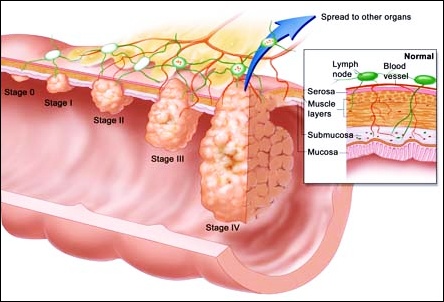| What is Rectal Tumor? |
The rectum is the last six inches of the large intestine, also called the colon. The rectum and connects to the anal canal, which leads to the anus which opens to the outside of the body. Because the rectum and colon are both part of the large intestine, many conditions of either are often referred to as colorectal.

Most rectal tumors form inside the lining of the rectum. Tumors can be either benign (non-cancerous) or malignant (cancerous). Tumors that are malignant begin when cells grow in an abnormal fashion. There are several types of benign and malignant tumors:
|
Benign Tumor |
Malignant Tumor |
|
|
| What is staging of rectal tumor? |
The severity of a tumor is defined by progressive stages.
Stage 0
-
The tumor has not spread and limited to the rectum’s innermost lining. It referred to as carcinoma in situ.
Stage I
-
Tumor has not spread beyond the wall of the rectum but tumor has spread through the rectum’s middle lining.
Stage II
-
Tumor has spread through the rectal wall, but not to any nearby lymph nodes.
Stage III
-
Tumor has spread to nearby lymph nodes, but has not spread beyond that.
Stage IV
-
Tumor has spread distant sites within the body, possibly to the lungs, liver, abdominal lining or ovaries.
| What is Risk Factor of Rectal Tumor? |
The exact risk factors of rectal tumor are not known. However, show that the following risk factors of rectal tumor increase a person’s chances of developing this disease.
- Age
Rectal tumor is more likely to occur as people get older. Most of the cases is after age 50 and the average at diagnosed is in the mid-60s.
- Polyps
Polyps are benign growth on the inner wall of the colon and rectum. Some types of polyps increase a person’s risk of developing colorectal tumor. Other than that, inherited condition, called familial polyposis causes hundreds of polyps to form in the colon and rectum. Unless this condition is treated familial polyposis is almost certain to lead to rectal tumor.
- Personal medical history
The people with history of tumor of the ovary, uterus, or breast have a somewhat increased chance of developing colorectal tumor. A person who has already had rectal tumor may develop this disease a second time.
- Family medical history
First-degree relatives (parents, siblings, children) of a person who has had colorectal tumor are somewhat more likely to develop this type of tumor themselves, especially if the relative had the tumor at a young age. Other than that, if many family members have had rectal tumor, the chances increase even more.
- Ulcerative colitis or Crohn’s disease
A person who has had a condition that causes inflammation of the colon for many years is at increased risk of developing colorectal tumor.
- Cigarette smoking
A person who smokes cigarettes nay be at increased risk of developing polyps and rectal tumor.
 |
Search for Best Treatment Rectal Tumor in Google search here |
